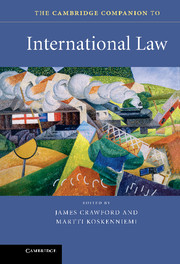Book contents
- Frontmatter
- Contents
- Preface
- Notes on contributors
- Introduction
- Part I The contexts of international law
- 1 International law in diplomatic history
- 2 International law in the world of ideas
- 3 International law as law
- Part II International law and the state
- Part III Techniques and arenas
- Part IV Projects of international law
- Guide to electronic sources of international law
- International law chronology
- Select guide to further reading
- Index
- References
1 - International law in diplomatic history
from Part I - The contexts of international law
Published online by Cambridge University Press: 05 July 2015
- Frontmatter
- Contents
- Preface
- Notes on contributors
- Introduction
- Part I The contexts of international law
- 1 International law in diplomatic history
- 2 International law in the world of ideas
- 3 International law as law
- Part II International law and the state
- Part III Techniques and arenas
- Part IV Projects of international law
- Guide to electronic sources of international law
- International law chronology
- Select guide to further reading
- Index
- References
Summary
Introduction:
The relationship of international law to the practice of international diplomacy, or to global politics, is obscure and, sometimes, paradoxical. As a prelude, then, to sketching the structuring role international law performs in the present phase of globalisation, or may have played at different moments in diplomatic history (a history that, for these purposes, emphasises the formal institutions and semi-formal practices of diplomacy in inter-state relations but encompasses, also, the broader world of international political life), it is important to say something about the ways in which the relationship might be framed in general. Three questions seem pertinent. Does international law influence or found the diplomatic system, or is it largely an irrelevance or trifling preoccupation? Has international law been a force for good (or for global well-being) in diplomatic history? And is it possible to speak intelligibly of a single body of norms, or way of thinking and acting, called ‘international law’? These questions might, in turn, generate (at least) three images or ways of thinking about the field: (1) international law as virtuous and marginal, (2) international law as constitutive and responsible and (3) international law as a combination of norm and aspiration. We can imagine other images, for example international law as substance and form or as change and stability or utopia and reality (Carr 1946), and other combinations: there are, no doubt, ways in which international law is constitutive and virtuous. I have chosen these three because of their ubiquity and influence, and for what I hope are the heuristic possibilities they offer.
Virtuous/marginal
Approached for the first time – by students, by state officials, by the intelligent, non-specialist reader – international law, as a body of principles or a way of doing things, might appear virtuous yet marginal. This, too, would be the self-description of many international lawyers. From this perspective, international law is a mostly frustrated project to civilise global politics, humanise war, tame anarchy, restrain the Great Powers and ensure fairer re-distributive outcomes.
- Type
- Chapter
- Information
- The Cambridge Companion to International Law , pp. 25 - 46Publisher: Cambridge University PressPrint publication year: 2012
References
- 9
- Cited by

